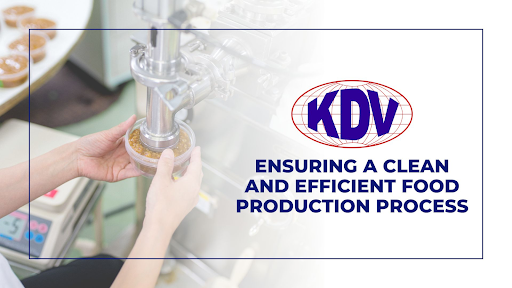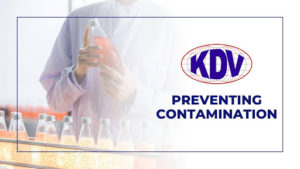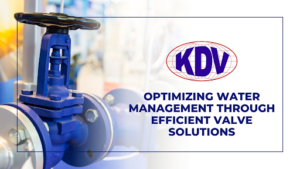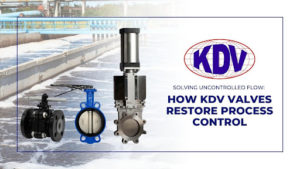Ensuring a Clean and Efficient Food Production Process
Maintaining the highest hygienic standards is absolutely paramount for food product suppliers in the food production industry. Contaminants can lead to spoilage, safety hazards, and costly product recalls. Clean-in-Place (CIP) systems are a cornerstone of food safety, and valves play a critical role in ensuring these systems work flawlessly.As per recent study additional steps are often introduced as a safeguard to ensure adherence to sanitation standards.. KDV Valves understands the food industry’s unique requirements and offers specialized solutions that uphold sanitation while boosting efficiency.

Clean-in-Place (CIP) systems are vital for sanitising processing equipment without the need for disassembly. In the food production industry, maintaining a clean and efficient CIP system is crucial not just for operational efficiency but also for ensuring product safety and quality. A properly functioning CIP system prevents contamination, reduces the risk of product recalls, and helps comply with stringent food safety regulations. By keeping the equipment free from residues and microorganisms, the system ensures that every batch of food produced is safe for consumption.
Typical CIP Cycle:
CIP cycles generally include the following steps:
- Pre-Rinse: Removes loose debris and the initial soil load.
- Detergent Wash: Utilises cleaning agents to break down and remove stubborn residues.
- Intermediate Rinse: Flushes out detergent and loosened residues.
- Sanitising: Applies sanitisers to kill any remaining microorganisms.
- Final Rinse: Removes any residual sanitisers and cleaning agents.
The Challenge: Implementing Efficient CIP Systems:
Ensuring the cleanliness and efficiency of food production processes relies heavily on the effective implementation of Clean-in-Place (CIP) systems. The rigorous demands of repeated cleaning cycles, the necessity of high-temperature sanitation, and the need for precise flow control present significant challenges
- Chemical Compatibility: Cleaning agents used in CIP systems are often highly caustic. Valves must be made from materials that resist corrosion to ensure the system’s longevity and prevent contamination. This is essential for maintaining the safety and quality of food products, as corroded equipment could introduce contaminants into the production process.
- Temperature Resistance: CIP processes frequently involve elevated temperatures to enhance cleaning. Valves need to be rated to withstand these high temperatures without degrading. In food production, maintaining this temperature resistance is critical to ensuring that cleaning processes are effective in eliminating harmful microorganisms.
- Flow Control: Precise control over the flow of CIP fluids is crucial for the efficient distribution of cleaning agents and thorough rinsing. Inadequate flow control can result in incomplete cleaning, leaving behind residues that may lead to contamination or spoilage of the food product.
- Leakage Prevention: Leaks can compromise the entire process by allowing CIP fluids to escape, which may lead to contamination or inefficient cleaning. Valves must reliably contain CIP fluids, ensuring the integrity of the system and safeguarding the cleanliness of food production processes.
- Automation Compatibility: Modern facilities often use automated CIP systems for efficiency and consistency. Valves must seamlessly integrate with these automated control systems to ensure consistent cleaning cycles. In the food industry, this consistency is vital for maintaining the high hygiene standards required to prevent contamination and ensure the safety of food products.
The Role of Diaphragm Valves in Food Production Processes
Diaphragm valves play a critical role in ensuring the cleanliness, efficiency, and safety of food production processes. Their design and functionality are especially well-suited to the stringent requirements of the food industry, making them an essential component of CIP systems. Understanding the diaphragm valve parts and what makes these valves different from all other valves highlights their importance in maintaining high standards in food production:
- Sanitary Design: One of the key features that sets diaphragm valves apart from other valves is their sanitary design. Are diaphragm valves sanitary? Absolutely. The smooth, flexible diaphragm effectively isolates the process media from the valve body and actuator, preventing the formation of pockets or crevices where contaminants could accumulate. This design ensures that food products are not exposed to potential contaminants, a crucial factor in avoiding product recalls and maintaining brand reputation.
- Precise Flow Control: The diaphragm, a central component among diaphragm valve parts, allows for precise control over fluid flow. This precision is critical in food production, where exact quantities of ingredients and cleaning agents are necessary for product consistency and safety. This level of control is what makes diaphragm valves different from all other valves, especially in applications requiring accurate dosing and flow regulation.
- Leak-Tight Seal: A defining feature of diaphragm valves is their ability to provide a leak-tight seal, minimising the risk of leaks. This is particularly important in CIP systems used in food production, as it ensures that cleaning agents are contained within the system, effectively sanitising equipment and preventing cross-contamination. The ability to maintain a reliable seal under varying conditions is another factor that distinguishes diaphragm valves from other valve types.
- Corrosion Resistance: The materials used in diaphragm valves are specifically chosen for their resistance to corrosive cleaning agents, ensuring longevity and reliability in CIP applications. This corrosion resistance is vital in food production, where harsh chemicals are often needed to meet stringent hygiene standards. By withstanding these conditions, diaphragm valves help maintain the integrity of the cleaning process over time, which is essential for food safety.
The Solution: KDV Valves for Your CIP Needs
KDV Valves offers a dedicated range of CIP-compatible valves designed specifically to overcome these challenges, ensuring the cleanliness, safety, and efficiency of your food production processes.
- Material Selection: The harsh chemicals used in CIP processes can cause significant wear and tear on equipment. KDV addresses this challenge by using high-grade stainless steel and other corrosion-resistant alloys, ensuring that your valves endure the rigours of repeated CIP cycles without compromising performance. This material selection is crucial for preventing contamination and maintaining the integrity of your food production process.
- Temperature Range: Effective sanitation in the food industry often requires high-temperature cleaning. KDV Valves are engineered to handle these elevated temperatures, ensuring consistent and thorough cleaning without degrading. This capability is vital for ensuring that your cleaning processes effectively eliminate harmful microorganisms, maintaining the safety and quality of your products.
- Flow Control: Precise flow control is essential for the optimal distribution of cleaning fluids throughout your system. KDV Valves offer fine adjustability, enabling you to maintain the exact flow rates needed for effective cleaning and rinsing. By ensuring accurate flow control, KDV helps prevent residue build-up that could lead to product contamination or spoilage.
- Leak-proof Operation: CIP systems demand reliable sealing to prevent leaks that could lead to contamination. KDV Valves feature advanced sealing technology, ensuring a leak-proof operation that protects your production process. This focus on preventing leakage is key to maintaining the cleanliness and efficiency of your CIP system.
- Automation Compatibility: In modern food production, automation is key to efficiency and consistency. KDV Valves are fully compatible with automation systems, allowing for seamless integration and ensuring consistent cleaning results with every cycle. This compatibility supports the high standards required in the food industry for preventing contamination and ensuring the safety of your products.
When it comes to food safety, there’s no room for compromise. Using CIP-compatible valves is imperative for a properly functioning sanitation system. KDV Valves deliver reliability, performance, and the hygienic features the food industry demands.
To discover how KDV Valves can safeguard your food production processes, contact their team of experts for guidance and customized solutions.


